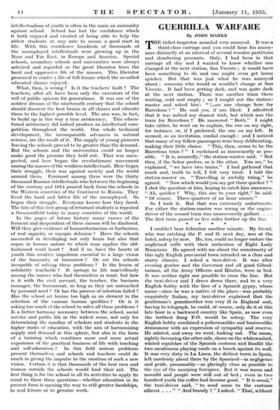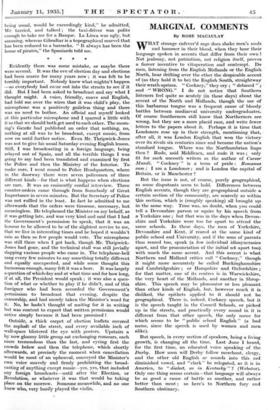GUERRILLA WARFARE
By JOHN MARKS
THE ticket-inspector sounded very annoyed. It was a third-class carriage and you could hear his annoy- ance distinctly at an interval of several wooden partitions and slumbering peasants. Only, I had been in that carriage all day and I wanted to know whether one Changed at the next station,. San Vicente ; its would have been something to do and one might even get home quicker. But that was just what he was annoyed about : someone who would or wouldn't change at San Vicente. It had been getting dark, and was quite dark at the next station. There- was another train, there waiting, cold and empty ;' so I sought out the station-. master and asked him: " 1,oes one change here for Barcelona ? " He said yes, if one liked. I admitted that it was indeed my dearest wish, but which was the train for Barcelona ? He answered " Both." I might take either, he went on to explain, the one on my right, for instance, or, if I preferred,- the one on my left. It seemed, as an invitation, cordial enough ; and I noticed that many of my fellow-passengers were busy deliberating, making their little choice. " This, then, seems to be the Barcelona train ? " I exclaimed as insouciantly as pos, sible. " It is, assuredly," the station-master said. " But then, if the Senor prefers, so is the other. You see," he explained, " we have two trains." I had gathered that much and, truth to tell, I felt very tired. I told the station-master so. -" Travelling is awfully tiring," he agreed. " Now which would you say got there quicker ? " I shot the question at him, hoping to catch him unawares. " Ah, quicker ? Why, this one to your right," he said. " Of course. Three-quarters of an hour sooner."
So I took it-. But that was extremely unfortunate. For either the station-master was wrong or the engine- driver of the second train was unnecessarily gallant. . . . The first train passed us five miles farther up the line.
* *- *
I couldn't bear Gibraltar another minute. My friend, who was catching the P. and 0. next day, was at the hotel; asleep by now. He, too, could no longer endure the anglicized cafe§ with their orchestras of Eight Lady Musicians. He agreed with me about the monstrosity of this ugly English provincial town intruded on a clear and starry climate. I asked a taxi-driver. It was after evening gunfire and the Governor and all good. Gibral- tarians, all the Army Officers and Hindus, were in bed. It was neither right nor possible to cross the line. But the taxi-driver and I drove down there, and to a very English bobby with the face of a Spanish gypsy, whose -name—since he was a native of the place—was probably exquisitely Italian, my taxi-driver explained that the gentleman's grandmother was very ill in England and, having to telegraph, he could, of course, only do• it at this late hour in a backward country like Spain, as now even the farthest flung P.O. would be asleep. The very English bobby combined a polieemanlike and businesslike demeanour with an expression of sympathy and reserve. He saluted, and away we went, looking sad. The moon, rightly favouring the other side, shone on the.whitewashed, whited sepulchre of the Spanish customs and floodlit the two earabineras playing cards on a bench against its wall. It was very dirty in La Linea, the dirtiest town in Spain, left carelessly about there by the Spaniard—in negligence and pride, presumably—as glaringly close as possible to the eye of the usurping foreigner. But it was warm and moonlit and people were still out of bed ; even in two hundred yards the coffee had become good. " It is usual," the taxi-driver said, " to send some to the customs officers . . . " " And brandy ? " I asked. " That, without being usual, would be exceedingly kind," he admitted. We tarried, and talked ; the taxi-driver was polite enough to-take me for a Basque. La Linea was ugly, but amusing, whereas Gibraltar is a topographical marvel that has been reduced to a barracks. " It always has been the home of pirates," the Spaniards told me.
* * * Evidently there was some mistake, or maybe there were several. It was the eve of election day and elections had been scarce for many years now ; it was felt to be terribly important. Nobody knew what mightn't happen —so everybody had come out into the streets to see if it did. But I had been asked to broadcast and say what I thought might. A voice, friendly, suave and English, had told me over the wires that it was child's play, the , microphone was a positively guileless thing and there was no need to bother. An official and myself looked at this particular microphone and I sparred a little with it so that We should both get used to each other. The morn- ing's -Gazette had published an order that nothing, no, nothing at all was to be broadcast, except music, from now on until further notice.. Even Mr. Thripwick-Jones was not to give his usual Saturday evening English lesson. Still, I was broadcasting in a foreign language, being relayed out of Spain, and all the terrible things I was going to- say had been translated -and examined by first the Police and then the Ministry of the Interior. To make sure, I went round to Police Headquarters, where in the doorway there were seven policemen of three different kinds—for that is what happens when elections are rare. It was an eminently cordial interview. Three counter-orders came through from Somebody of Great Importance.in seven minutes. But the Secretary of Police was not ruffled in the least. In fact he admitted to me afterwards that the orders were tiresome, necessary, but meaningless. He telephoned the Minister on my behalf, as it was getting late, and was very kind and said that I had the Government's permission to speak, that it was an honour to be allowed to be of the slightest service to me, that we live in interesting times and he hoped it wouldn't rain as then so few people would vote. The microphone was still there when I got back, though Mr. Thripwick- Jones had gone, and the technical staff was still jovially slapping various people who came in. The telephone-bell rang every few minutes to say something totally different and equally unexpected, and while some thought this humorous enough, many felt it was a bore. It was largely a question of which day and at what time and for how long, if at all, the President would speak ; it was also a ques- tion of what or whether to play if he didn't, and of this foreigner who had been accorded the Government's permission- to broadcast that evening, despite the censorship, and had merely taken the Minister's word for it. No, he' hadn't thought of waiting for it in writing but was content to expect that written permission would arrive simply because it had been promised !
Outside, a thick carpet of election leaflets covered the asphalt of the street, and every available inch of wall-space blistered the eye with posters. Upstairs a by now gloomy little group sat exchanging rumours, each more tremendous than the last, and eyeing first the crowds below and then the telephone, which shortly afterwards, at precisely the moment when cancellation would be most of an upheaval, conveyed the Minister's own voice suavely and firmly prohibiting the broad- casting of anything except music—yes, yes, that included any foreign broadcasts—until after the Election, or Revolution., or whatever it was that would be taking place on the morrow. Someone meanwhile, and no one knew who, very busily played the violin.







































 Previous page
Previous page